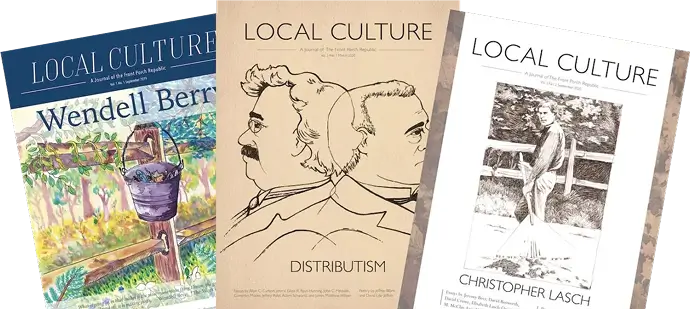literature 44
Prickly Porcupine on Natural Law: A Review of David Lyle Jeffrey’s Tales From Limerick Forest
Hence this book is something special: a new set of Christian fables on natural law that do more than teach simple morals or seek to modify children’s behavior.
Human Dominion in Kipling’s Just So Stories
Rudyard Kipling’s 1902 Just So Stories are a delightful anomaly—they feel like folk tales but were largely invented by Kipling himself as bedtime stories for his eldest daughter, Josephine.
A Challenge in Charity: A Review of Deep Reading
To counter dogmatic worldviews, we should read prudently and widely across time periods and cultures and not avoid difficult content because of fear.
For the Love of Books
Out-of-sight, out-of-mind is the quintessential modern American problem-solving strategy, and it sure does have a lot going for it, when it comes to dealing with our problem of stuff—that other…
Narnia Against the Machine: Deep Magic for the Modern Age
Witnessing the ascendancy of the Machine, Lewis understood what was at stake. He watched this ideology sweep across his society and take hold in its schools, and he keenly felt…
Gatsby: Grasping for Transcendence
Gatsby’s character yearns for the infinite; he sparkles with something unusual in the midst of the lavish wealth and chaotic parties of Long Island’s frivolities. Gatsby has “one of those…
Democracies Need Shared Literature
Before we totally condemn the Athenians as selfish, entertainment-addicted bad citizens—which, to be fair, they sometimes (or often?) were, just like us—it is worth considering what such shared democratic spaces…
An Empty Room of One’s Own
There are things that a full room can do for us. It can reassure us. It can offer comfort. It can offer luxury and pleasant distractions. A full room can…
Invitations to Dwell
We soaked in the morning and our coffee, aware that we were technically trespassing. But, at the moment, we felt the weight of heritage, a complicated term that outmatched the…
Jonathan Swift’s Street Cred
Swift knocked out several tracts and sermons on the problems of the Irish economy. And in them he said, in good FPR fashion, several FPRish things—for example, that place matters.
Returning to the Love of the Book
Hooten Wilson draws on theological as well as literary works to demonstrate various approaches to a text, leading to the contemplative mode, which she asserts should be “the end of…
Advisor Wanting: The Absence of Moral Limits in Lady Macbeth
Our best ally should not be a man or woman who lacks the aptitude to discern right from wrong...one should not draw unto himself or herself a companion like Lady…
Vaya con Dios: Cormac McCarthy (1933-2023)
Somewhat surprisingly, this is also McCarthy at his most delighted at everyday joys. There are many tender passages of drinking coffee in porcelain cups in diners, eating tortillas and beans…
Updating Homer for Sensitive Modern Readers: A Tongue-in-Cheek Proposal
As we reflect on the importance of this work in ensuring that Homer remains appropriate and enjoyable for future readers, we can surely agree that it is fully worth it.
P.G. Wodehouse and the Idea of Genius
We might not use the word “genius” in all these contexts, but the mystery is the same. Where did this exceptional ability come from? Is it just another trait like…
Ronald Blythe at 99: A Charitable Observer from Wormingford
What makes Blythe a joy to read is this rare combination of literary erudition, keen observation of both men and nature, and a reserved, peaceful piety. What is immediately apparent…
Reading with Our Hearts: A Review of Enjoying The Bible
Enjoying the Bible is a book about beholding the deep riches of beauty in Scripture and allowing its literary elements to shape our humanity. A literary approach to Scripture teaches…
“Torches of Freedom”: The Anti-Literature of Advertising
“The conscious and intelligent manipulation of the organized habits and opinions of the masses is an important element in democratic society. Those who manipulate this unseen mechanism of society constitute…
To Quantify the Complexity of a Book
There's a computer program called Lexile that purports to measure the complexity of books and thereby determine the grade level for which they are best suited. Here's the description: Lexiles…
The Primary Error of Early English Education
During my brief foray into public education, I taught a group of seventh-graders a typical lesson from a standard middle school literature textbook: we read a chapter from Ramsey Ullman’s…
















